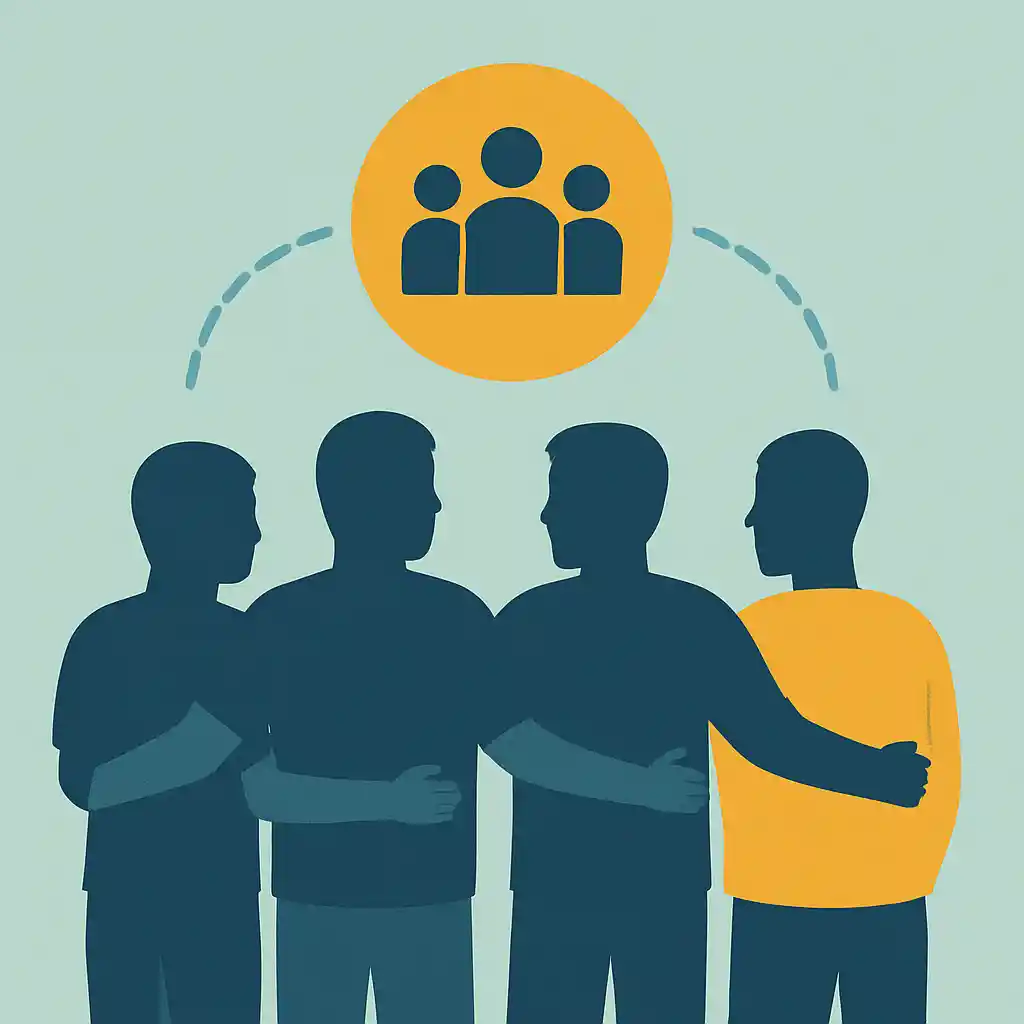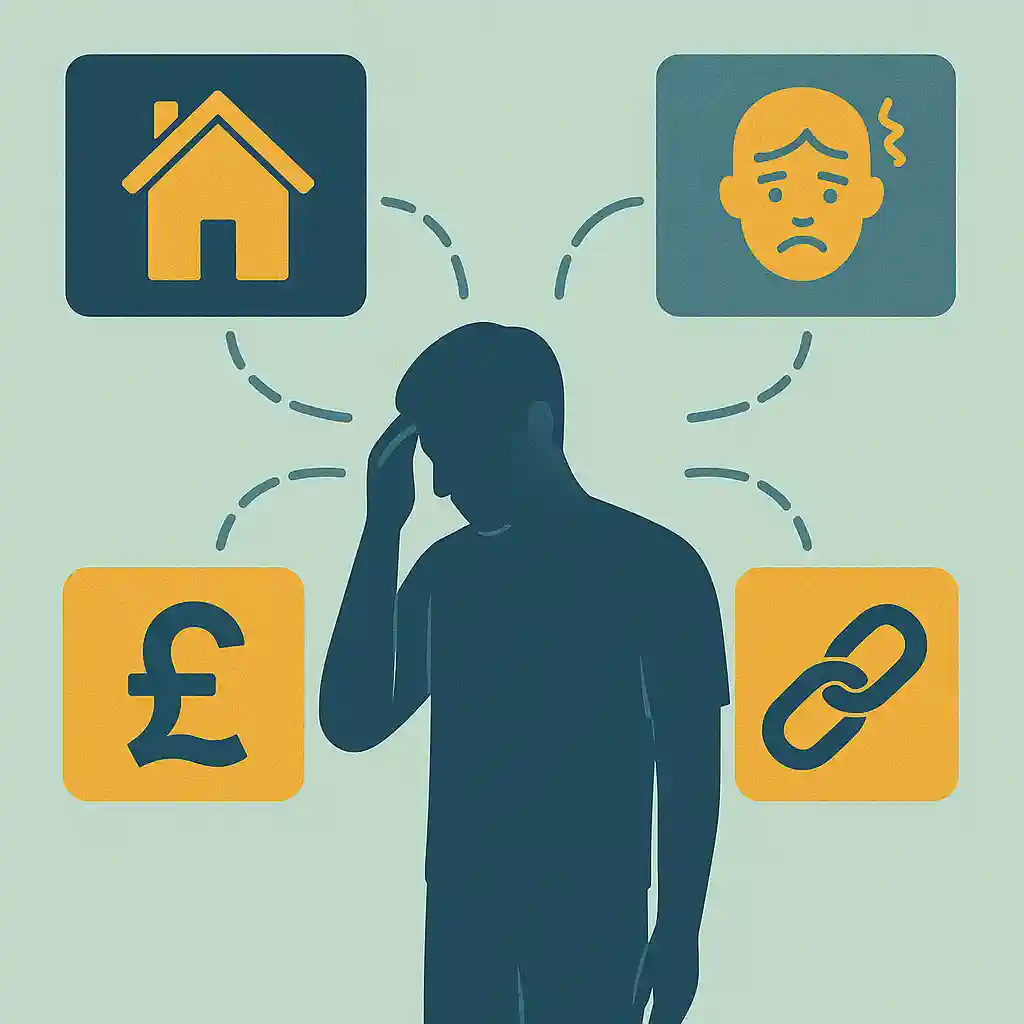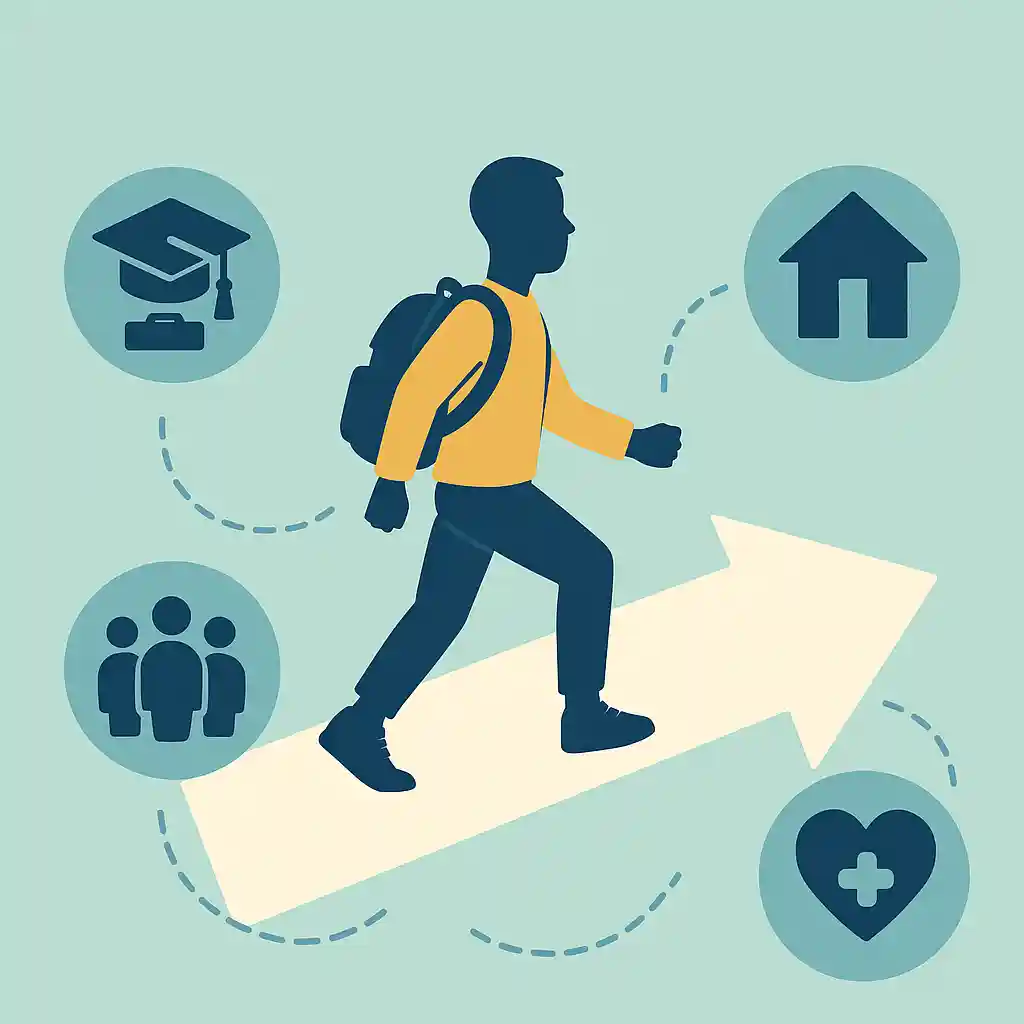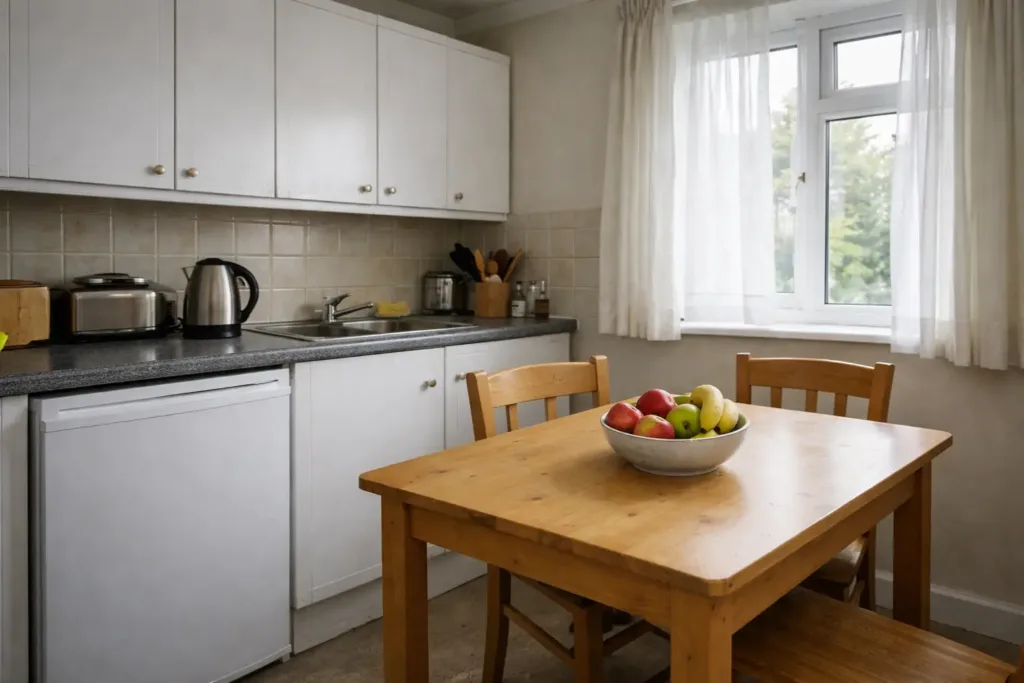Preparing for adulthood is a major milestone for every young person. This guide explores the next steps in education, work, health, and independent living, ensuring positive preparing for adulthood outcomes that build confidence, resilience, and brighter futures.
Preparing for adulthood is one of the most important milestones in any young person’s life. It marks the moment where childhood support gradually shifts towards independence, responsibility, and self-discovery. For young people in care, those with special educational needs, or anyone facing additional challenges, this stage can feel both exciting and overwhelming. That is why careful planning, encouragement, and the right support make all the difference.
In the UK, preparing for adulthood is more than simply leaving school or finding a job. It is about ensuring that every young person has the skills, opportunities, and confidence to take their next step whether that is moving into further education, beginning adulthood work, finding suitable housing, or developing life skills that lead to greater independence. The process is rooted in four key outcome areas: education and employment, independent living, participation in society, and health and wellbeing. Together, these outcomes form a clear pathway to help young people transition successfully into adult life.
This article explores what preparing for adulthood really means, why it matters, and how children’s homes, families, schools, and care providers can work together to secure positive futures. From practical guidance on independent living to strategies for achieving meaningful preparing for adulthood outcomes, our goal is to offer reassurance, clarity, and real-world advice. Because with the right support, every young person can look forward to a brighter, more confident future.
1. Understanding Preparing for Adulthood
When we talk about preparing for adulthood, it is easy to think only about practical steps like leaving school, getting a job, or moving into your own home. While these milestones are important, the process is much broader and begins earlier than many realise. In the UK, the government’s Special Educational Needs and Disability (SEND) Code of Practice encourages planning for adulthood to start as early as age 14, so that young people have time to develop the skills, aspirations, and support networks they need for a smooth transition.
At its heart, preparing for adulthood is about ensuring that no young person is left to face independence alone. It requires cooperation between schools, local authorities, children’s homes, health services, and families to create a joined-up plan that is realistic, personalised, and focused on long-term wellbeing. For young people in care or those with additional needs, this level of planning is even more crucial, as the risk of falling through gaps in support can be high.
The Four Key Outcome Areas
The UK framework for preparing for adulthood is built around four outcome areas. Each one plays a vital role in helping young people achieve independence and confidence:
- Education and Employment – making sure young people continue learning, gain qualifications, and access pathways to employment, apprenticeships, or higher education.
- Independent Living – supporting young people to learn practical life skills such as budgeting, cooking, managing bills, and securing housing.
- Participation in Society – encouraging young people to take part in their communities, build friendships, volunteer, and access leisure activities that improve confidence and reduce isolation.
- Health and Wellbeing – promoting both physical and mental health, ensuring access to doctors, therapists, and community health services that keep young people safe and supported.
Why Early Preparation Matters
Preparing for adulthood is not a one-off event but a journey. Starting early allows young people to grow gradually in confidence, build resilience, and make informed choices about their future. Without this preparation, the leap into independence can feel sudden and overwhelming a “cliff edge” moment often described by care leavers. By focusing on the four outcome areas and tailoring support to each individual, professionals and families can create a pathway that helps every young person achieve meaningful preparing for adulthood outcomes.
2. Education and Employment Pathways
For most young people, the journey of preparing for adulthood begins with decisions about education and work. These are often the first big choices that shape the future, and they can feel overwhelming without the right guidance. Education and employment are not just about qualifications or paycheques. They are about finding purpose, building confidence, and taking the next step towards independence.
Continuing Education and Training
Education is a powerful tool in opening doors to adulthood work. For some young people, this may mean staying in school beyond 16, moving on to sixth form, or enrolling in further education colleges. Others may find vocational training, apprenticeships, or supported internships better suited to their needs and aspirations.
For care leavers and young people with additional needs, having access to personalised education plans and tailored career guidance is vital. Support can include:
- Extra tutoring or mentoring to build confidence.
- Access to vocational courses that match individual strengths.
- Work experience placements to develop real-world skills.
- Encouragement to explore creative or practical talents alongside academic options.
The aim is not just to pass exams, but to prepare young people for the responsibilities and opportunities of adult life.
Employment and Work Readiness
Transitioning into the workplace is often one of the most exciting yet challenging aspects of preparing for adulthood outcomes. Some young people thrive in structured apprenticeships, while others may need gradual exposure to the workplace through volunteering, part-time jobs, or supported employment programmes.
Work readiness involves more than technical skills. It also includes “soft skills” such as teamwork, punctuality, communication, and resilience. For young people in care, these may need to be nurtured over time, especially if past experiences have made it difficult to trust others or feel confident in new environments.
Partnerships between schools, employers, and children’s homes play a crucial role in bridging the gap. Programmes like Step Change, used in some residential care services, are designed to provide structured pathways into adulthood work, ensuring young people are not left facing the job market alone .
Overcoming Barriers
Unfortunately, not every young person has equal access to opportunities. Care leavers, those with SEND, and young people from disadvantaged backgrounds often face barriers such as limited networks, disrupted education, or a lack of work experience. Preparing for adulthood in these cases requires targeted support, such as:
- Access to career advisers who understand care experiences.
- Extra funding or bursaries for training and apprenticeships.
- Employers trained in inclusive recruitment and workplace support.
- Ongoing mentoring to help young people settle into employment.
By breaking down these barriers, society can give every young person the chance to succeed in adulthood work and achieve their aspirations.
Independent Living Skills
One of the most important aspects of preparing for adulthood is learning how to live independently. For young people who have grown up in care or who may not have strong family support, these skills are absolutely vital. Independence is not just about having a roof over your head. It is about feeling confident to manage daily life, make decisions, and take responsibility for your future.
Building Life Skills
Independent living involves a wide range of practical abilities that many people take for granted. These include:
- Budgeting and money management – understanding how to pay bills, save money, and avoid debt.
- Cooking and nutrition – learning how to prepare healthy meals and shop on a budget.
- Household management – taking care of cleaning, laundry, and maintaining a safe living environment.
- Health and safety awareness – knowing how to register with a GP, book appointments, and manage basic first aid needs.
For young people, especially those in care, learning these skills step by step can transform the daunting idea of independence into something achievable and empowering.
Supported Living Options
Not every young person is ready to move straight from a children’s home or foster placement into complete independence. That is why many care providers, including Welcare, offer supported living services . These environments give young people the opportunity to practise independence while still having guidance close by when needed.
Supported living often includes:
- Semi-independent accommodation with shared or individual flats.
- Key workers who provide advice and check in regularly.
- Opportunities to practise budgeting and household management with safety nets in place.
- Gradual step-down support, so young people are not suddenly left alone.
This approach ensures that independence is built gradually, reducing the risk of young people feeling abandoned or unprepared when they leave care.
Balancing Independence with Support
True independence does not mean young people should be left without help. The goal is to balance freedom with ongoing support. Many care leavers describe the transition to adulthood as facing a “cliff edge,” where the support they once relied on suddenly disappears. Preparing for adulthood should remove this fear by ensuring that help continues through clear pathway plans and community-based support.
Independent living should always be framed as a journey rather than a single step. Some young people may thrive quickly, while others will need more time and encouragement. What matters is that every young person feels capable of taking responsibility for themselves while knowing that support is still available if they need it.
4. Community Participation & Social Belonging

While education, work, and independent living are essential, preparing for adulthood is also about belonging. Every young person deserves to feel connected to their community, to form positive relationships, and to take part in activities that bring joy and purpose. Without this sense of belonging, even the most practical preparations for adulthood can feel incomplete.
Why Community Matters
Being part of a community helps young people develop confidence, resilience, and identity. It also reduces the risk of loneliness and isolation, which can be common challenges for care leavers or those moving into independence. A strong sense of belonging supports mental health, encourages positive choices, and gives young people opportunities to build networks outside of formal care.
Ways to Participate
There are many different ways young people can engage with their communities:
- Volunteering – offering time to local charities, youth centres, or community projects builds skills and confidence.
- Joining clubs or groups – sports teams, art classes, and youth groups create safe spaces for friendships to grow.
- Local events – taking part in community festivals, workshops, or cultural events helps young people feel proud of their area.
- Youth voice initiatives – being part of participation groups where young people’s opinions shape services is an empowering step towards adulthood.
For care-experienced young people, participation also helps challenge stigma. By being visible and active in their communities, they are seen for their talents, contributions, and potential rather than their past circumstances.
Case Example
A young person leaving residential care who joins a local football club may find more than just exercise. They discover teamwork, build friendships, and learn discipline. Over time, this participation contributes to better health, stronger social networks, and a sense of identity beyond care. These are the types of preparing for adulthood outcomes that help young people thrive.
5. Health and Wellbeing in Adulthood Transition
A successful journey in preparing for adulthood is not only about education, work, or independent living. Health and wellbeing form the foundation that allows young people to thrive in every other area of life. Without good physical and mental health, it is much harder to succeed in employment, sustain relationships, or manage independence.
Physical Health
One of the first steps in adulthood is learning how to take responsibility for your own health. For young people, this includes registering with a GP, attending regular check-ups, and learning how to manage everyday health needs. Healthy routines such as eating well, exercising, and getting enough sleep become more important as young people take on greater independence.
Young people in care or leaving care may not always have had consistent access to healthcare. That is why pathway planning must include practical guidance: ensuring medical records are transferred, introducing young people to local health services, and providing advice on accessing NHS services.
Mental Health and Emotional Wellbeing
For many young people, the biggest challenges in adulthood are emotional rather than physical. Stress, anxiety, and the impact of past trauma can make the transition feel overwhelming. This is why mental health support must be a key part of preparing for adulthood outcomes.
Therapies such as cognitive behavioural therapy (CBT), play therapy, and equine therapy offered by organisations like Welcare can provide safe, creative spaces for young people to build resilience and process their experiences. Access to counselling, youth mental health services, and supportive key workers ensures that young people are not left to manage difficult emotions alone.
Accessing the Right Support
Health services for young people can be complex to navigate. Preparing for adulthood must therefore include teaching young people how to book appointments, advocate for their needs, and access specialist support when required. For those with long-term health conditions or disabilities, careful planning is needed to ensure smooth transitions from children’s services to adult healthcare providers.
Promoting a Healthy Lifestyle
Beyond services, wellbeing is also about daily habits. Encouraging young people to cook balanced meals, stay active, practise mindfulness, and avoid harmful coping strategies like substance misuse are all part of preparing for adulthood. Professionals and families play a crucial role in modelling positive behaviours and celebrating small, healthy lifestyle choices.
By placing health and wellbeing at the centre of transition planning, we can give young people the confidence and energy to pursue their goals, sustain independence, and enjoy life as adults.
The Role of Care Providers and Professionals
While family and community support are vital, many young people rely on care providers and professionals to help them take the next step in their journey to independence. For those in residential care or supported accommodation, trusted adults such as key workers, teachers, and social workers play a central role in preparing them for adulthood.
Pathway Planning
Every young person leaving care should have a Pathway Plan. This is a personalised document that outlines their goals for the future and the support they will need to get there. Plans are created in partnership with the young person, their carers, social workers, and other professionals. Importantly, they should cover all four preparing for adulthood outcome areas: education and employment, independent living, health and wellbeing, and participation in society.
When pathway planning is done well, it gives young people a clear sense of direction and reassurance that they will not face independence alone.
Person-Centred Support
The most effective professionals put young people at the heart of decision-making. This approach, often called person-centred planning, ensures that the young person’s voice is listened to and their preferences respected. For example, one young person might be focused on gaining an apprenticeship, while another may need more support to feel confident about living independently. Care providers must adapt their approach to each individual’s strengths, challenges, and ambitions.
Continuing Support Beyond 18
One of the biggest concerns for care leavers is that support often drops suddenly when they turn 18. To avoid this “cliff edge,” many organisations now extend care beyond legal adulthood. For example, Homes2Inspire’s Step Change package supports young people up to the age of 25, ensuring continuity and measuring success through outcome frameworks .
Welcare and other providers also recognise that young people may still need guidance even after moving into supported or independent living. By offering ongoing check-ins, therapeutic services, and community-based support, professionals help create a safety net during this vulnerable transition.
Trusted Relationships
For many care-experienced young people, professionals may be the most consistent adults in their lives. The trust built between a young person and a key worker or teacher can make a lasting difference, helping them feel safe enough to take risks, learn new skills, and step into adulthood with confidence.
Ultimately, care providers and professionals are not just preparing young people for independence. They are preparing them for adulthood with the tools, resilience, and encouragement needed to build a future filled with opportunity.
7. Challenges and How to Overcome Them

The journey of preparing for adulthood is rarely straightforward. Many young people, particularly those with care experience or additional needs, face barriers that can make the transition more complex. Recognising these challenges is the first step. Providing solutions and ongoing support ensures they do not become permanent obstacles.
Common Challenges
-
Housing Instability
Finding safe, affordable housing is one of the biggest hurdles for young people leaving care. Without stable accommodation, it becomes difficult to focus on education, employment, or wellbeing.
-
Unemployment and Limited Opportunities
Young people may struggle to access work opportunities due to limited experience, disrupted education, or lack of employer awareness about care-experienced backgrounds.
-
Mental Health Difficulties
Many young people leaving care carry the impact of past trauma, which can manifest as anxiety, depression, or difficulty trusting others. Without ongoing mental health support, these challenges can affect every aspect of adulthood.
-
Financial Pressure
Managing money for the first time can be overwhelming. Care leavers may not have a financial safety net, making budgeting mistakes feel more serious than for their peers.
-
Lack of Networks
Unlike peers who can lean on family connections, some care leavers face adulthood without a strong support system. This can lead to isolation and make it harder to access opportunities.
Strategies for Overcoming Barriers
-
Stable Housing Pathways
Local authorities and providers like Welcare offer supported living models that bridge the gap between care and independence. These ensure young people are not left to navigate housing alone.
-
Inclusive Employment Support
Apprenticeships, traineeships, and supported internships create accessible routes into adulthood work. Partnerships between employers and children’s services can help remove stigma and create welcoming workplaces.
-
Mental Health and Wellbeing Services
Access to counselling, therapy, and trauma-informed care must continue beyond 18. Ongoing therapeutic support is essential for building resilience.
-
Financial Education
Teaching budgeting, savings, and money management skills in a practical, hands-on way prepares young people to manage their finances confidently.
-
Mentoring and Peer Support
Having a trusted adult or mentor provides encouragement and guidance, while peer networks allow young people to share experiences and feel less alone.
Building Resilience
While challenges can feel overwhelming, it is important to emphasise resilience. Preparing for adulthood is not about avoiding setbacks but learning how to manage them with confidence. With the right guidance, even difficult experiences can become stepping stones towards independence.
By addressing barriers head-on and ensuring continued support, we can make sure that preparing for adulthood outcomes are positive, sustainable, and empowering for every young person.
8. Preparing for Adulthood Outcomes – Measuring Success
When professionals talk about preparing for adulthood outcomes, they are referring to the long-term results that show whether young people have been supported effectively on their journey towards independence. Outcomes are not just about ticking boxes. They are about real, meaningful progress that improves quality of life.
What Do Outcomes Look Like?
Positive preparing for adulthood outcomes might include:
- Stable housing – living in secure, safe accommodation, whether supported or independent.
- Sustained education or employment – being enrolled in training, in further or higher education, or in meaningful adulthood work.
- Improved health and wellbeing – regular access to healthcare, stable mental health, and healthy daily routines.
- Active participation in society – friendships, volunteering, community involvement, and positive use of leisure time.
Measuring Success
Outcomes are measured through both formal systems and personal progress. For example:
- Local authorities track care leavers’ housing, education, and employment at ages 19, 21, and 25.
- Organisations like Homes2Inspire use frameworks such as the Star Outcomes Framework to evaluate progress during and after care .
- Schools and care providers record achievements in qualifications, life skills, and personal development.
Most importantly, success should be defined with the young person. A successful outcome for one individual may be securing a job, while for another it may be developing the confidence to live independently. Preparing for adulthood must recognise and celebrate each unique journey.
Why Outcomes Matter
By focusing on outcomes, rather than just processes, professionals ensure that support genuinely prepares young people for adult life. Outcomes provide accountability, show where more support is needed, and highlight what works well. For young people, seeing their own progress reflected in tangible outcomes can be a powerful motivator to keep moving forward.
9. Taking the Next Step – Advice for Young People & Families

The move into adulthood is not a single leap but a series of small, steady steps. For young people, especially those in care or with additional needs, having clear guidance and encouragement can make the journey feel less daunting. For families and carers, understanding how to offer the right balance of support and independence is equally important.
Advice for Young People
-
Set Realistic Goals
Preparing for adulthood is easier when broken down into manageable goals. Start with small steps, like learning to budget weekly, before moving on to bigger goals such as finding accommodation or applying for adulthood work.
-
Ask for Support
Independence does not mean doing everything alone. Whether it’s a teacher, a key worker, or a mentor, reach out for advice when you need it.
-
Celebrate Progress
Every achievement, no matter how small, is a sign of growth. Recognising these milestones builds confidence and motivation.
-
Stay Open to Opportunities
Not every path is straightforward. Apprenticeships, volunteering, or community activities can open doors you might not expect.
Advice for Families and Carers
-
Encourage Independence Gradually
Allow young people to practise skills like cooking, budgeting, or travel while still in a supportive environment. This builds confidence before they take the final step into independence.
-
Be a Steady Presence
Even when young people seem independent, knowing that support is available if needed provides reassurance.
-
Support Pathway Planning
Be actively involved in pathway planning meetings. Your insight into a young person’s strengths and challenges can shape more effective preparing for adulthood outcomes.
-
Promote Confidence and Resilience
Praise effort as much as results. Remind young people that setbacks are part of learning and not a sign of failure.
A Shared Journey
Preparing for adulthood works best when young people, families, carers, and professionals all work together. Independence does not mean isolation it means having the skills, networks, and confidence to take responsibility while still knowing that support is within reach.
The key message for both young people and families is simple: the next step does not need to be perfect, it just needs to be taken. With steady progress, every young person can look forward to a brighter and more secure future.
Preparing for adulthood
is one of the most significant transitions in a young person’s life. It is a time of growth, opportunity, and independence, but it can also bring challenges and uncertainty. That is why early planning, strong support networks, and clear pathways are so essential.
From education and adulthood work opportunities to independent living, health, and community participation, the journey is shaped by many interconnected factors. Each step taken no matter how small contributes to positive preparing for adulthood outcomes that help young people thrive.
For young people, the message is clear: you are not alone in this journey. Whether through family, carers, professionals, or community groups, there are people ready to guide and support you. For families and care providers, the challenge is to nurture independence while ensuring safety and stability, creating the balance every young person needs to succeed.
At Welcare, we believe that preparing for adulthood is not about reaching a final destination but about building a future filled with possibility. By offering therapeutic care, supported living, and personalised guidance, we aim to ensure that every young person has the tools and confidence to take their next step into independence.
The future may feel uncertain, but with the right support, every young person can step into adulthood with resilience, hope, and the belief that their best days are ahead.
Explore More
- Learn more about Supported Living Services at Welcare and how we help young people develop independence in a safe environment.
- Discover the benefits of Therapeutic Care at Welcare, including CBT, play therapy, and equine therapy.
- Make a referral through our Welcare Contact and Referral Page to begin support for a young person.
- Department for Education: SEND Code of Practice: 0 to 25 years – statutory guidance on support and transition for young people.
- GOV.UK: Leaving foster or local authority care – guidance on rights and support for care leavers.
- Ofsted: Children’s social care services – information on regulation and inspection of services supporting young people.
Got a question?
Frequently Asked Questions
What is preparing for adulthood?
Preparing for adulthood is the process of helping young people, especially those in care or with additional needs, transition into independent adult life. It covers four key areas: education and employment, independent living, community participation, and health and wellbeing. The aim is to give young people the skills, opportunities, and confidence they need to thrive as adults.
Why is preparing for adulthood important?
Preparing for adulthood is important because it ensures that young people are not left to face independence without support. With the right preparation, they are more likely to find stable housing, succeed in education or work, stay healthy, and feel connected to their communities. Without it, the move into adulthood can feel overwhelming and increase the risk of poor outcomes such as homelessness, unemployment, or isolation.
What are the preparing for adulthood outcomes?
The preparing for adulthood outcomes are the positive results that show a young person is ready for independence. They include:
- Living in safe and secure housing.
- Continuing in education, training, or adulthood work.
- Maintaining good physical and mental health.
- Building friendships, networks, and community connections.
These outcomes give professionals and families a way to measure progress and ensure young people are supported to achieve their goals.
At what age does preparing for adulthood start?
In the UK, preparing for adulthood planning usually begins around the age of 14, especially for young people with special educational needs or disabilities (SEND). This early start gives enough time to identify goals, build life skills, and prepare for the next steps after school. For care leavers, planning should begin well before their 18th birthday to avoid a sudden “cliff edge” of support.
How does preparing for adulthood link to education and work?
Education and employment are central to preparing for adulthood. Whether through school, apprenticeships, or vocational training, young people are supported to develop skills and qualifications that open doors to adulthood work. Work experience, mentoring, and career guidance also help young people explore their interests and build confidence in the workplace.
What support is available for young people leaving care?
Young people leaving care are entitled to pathway planning, housing support, and ongoing guidance from local authorities and care providers. Organisations such as Welcare also offer supported living services, therapeutic care, and practical life skills training to ensure that young people do not face independence alone.







